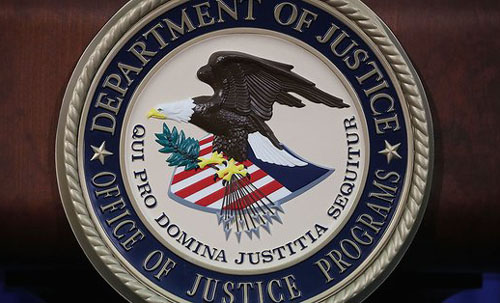by WorldTribune Staff, March 22, 2020
Amid the coronavirus outbreak, the Department of Justice reportedly is seeking “emergency” powers which would grant it the ability to ask chief judges to detain people indefinitely without trial.
Politico reported on Saturday that it had reviewed documents which “detail the department’s requests to lawmakers on a host of topics, including the statute of limitations, asylum and the way court hearings are conducted.”
 Sen. Mike Lee, Utah Republican, tweeted: “OVER MY DEAD BODY”.
Sen. Mike Lee, Utah Republican, tweeted: “OVER MY DEAD BODY”.
“The right to see a judge and seek release from detention after an arrest — known in legal lingo as habeas corpus — is one of the fundamental building blocks of a democratic society, one in which the state cannot deprive individuals of their freedom without due process. The times in American history when that right has been suspended or circumvented are some of the darkest. We should not be seeking to repeat them,” Eric Boehm wrote for Reason.
Scott Bullock, president and general counsel for the Institute for Justice, a libertarian law firm, said: “The DOJ proposal is deeply troubling and would raise a whole host of constitutional concerns. History demonstrates again and again that governments use a crisis to expand power and violate vital constitutional principles. And when the supposed emergency is over, the expanded powers often become permanent.”
The DOJ’s requests “span several stages of the legal process, from initial arrest to how cases are processed and investigated,” Politico reported.
In one of the documents, the DOJ proposed that Congress grant the attorney general power to ask the chief judge of any district court to pause court proceedings “whenever the district court is fully or partially closed by virtue of any natural disaster, civil disobedience, or other emergency situation.”
The DOJ is also asking Congress to grant top judges broad authority to pause court proceedings during emergencies, the report said. It would apply to “any statutes or rules of procedure otherwise affecting pre-arrest, post-arrest, pre-trial, trial, and post-trial procedures in criminal and juvenile proceedings and all civil process and proceedings,” according to draft legislative language the department shared with Congress. In making the case for the change, the DOJ wrote that individual judges can currently pause proceedings during emergencies but that their proposal would make sure all judges in any particular district could handle emergencies “in a consistent manner.”
The request raised eyebrows because of its potential implications for habeas corpus — the constitutional right to appear before a judge after arrest and seek release.
Norman L. Reimer, executive director of the National Association of Criminal Defense Lawyers, said the DOJ’s proposals would mean that “you could be arrested and never brought before a judge until they decide that the emergency or the civil disobedience is over. I find it absolutely terrifying. Especially in a time of emergency, we should be very careful about granting new powers to the government. That is something that should not happen in a democracy.”
In another request, the DOJ is looking to change the Federal Rules of Criminal Procedure in some cases to expand the use of videoconference hearings and to let some of those hearings happen without defendants’ consent, according to the draft legislative text, the report said.
“Video teleconferencing may be used to conduct an appearance under this rule,” read a draft of potential new language for Federal Rule of Criminal Procedure 5(f), crossing out the phrase “if the defendant consents.”
“Video teleconferencing may be used to arraign a defendant,” read draft text of rule 10(c), again striking out the phrase “if the defendant consents.”
Reimer said forcing people to have hearings over video rather than in person would threaten civil liberties.
“If it were with the consent of the accused person it would be fine,” he said. “But if it’s not with the consent of the accused person, it’s a terrible road to go down. We have a right to public trials. People have a right to be present in court.”
The DOJ’s requests are unlikely to make it through a Democratic-led House.
Lawmakers were adamant in their opposition to the power grab:
“Congress must loudly reply ‘NO,’ ” Rep. Justin Amash, Michigan Republican, tweeted.
Intelligence Brief __________ Replace The Media
